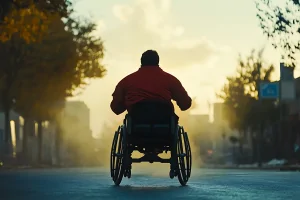Traumatic Brain Injury (TBI) is a serious health condition with complex implications, especially among military veterans. The effects of TBI can be extensive and life-altering, impacting physical health, mental well-being, and overall quality of life. Leah Bucholz provides critical insights into Traumatic Brain Injury and Veterans Disability. In this article, we will delve into the causes, types, symptoms, and residual effects of traumatic brain injury and veterans disability process for veterans affected by this condition.
Table of Contents
What Is Traumatic Brain Injury (TBI)?
According to the Cleveland Clinic, TBI is a significant medical issue that disrupts brain function due to a traumatic impact, such as a hard bump or jolt to the head, or penetration by an object. This condition can result in severe consequences, both immediately and long-term. TBI is a major cause of death and disability in the United States, affecting thousands of people each year. In 2020, over 214,000 people required inpatient care for TBI, and over 69,000 individuals died due to TBI-related complications.
The nature and severity of TBI can vary widely. There are two main types of TBI: penetrating TBI and blunt TBI. Penetrating TBI occurs when an object, like shrapnel, penetrates the skull and damages brain tissue. Veterans, especially those deployed in combat zones, may be at risk for penetrating TBI from explosive devices or projectiles. Blunt TBI, on the other hand, is a non-penetrating injury caused by a strong blow to the head. Many veterans have experienced blunt TBI during training exercises or accidents, often without realizing the potential long-term impact on their health.
Types and Severity Levels of TBI
TBI is generally classified into three levels of severity: mild, moderate, and severe. Each level can present distinct symptoms and potential long-term effects.
1. Mild TBI
Mild TBI, commonly known as a concussion, may not always result in loss of consciousness. It can occur from blast injuries or any incident that causes rapid movement or jarring of the head. Symptoms may develop immediately or within a few days and include:
- Nausea and vomiting
- Dizziness and balance issues
- Headaches and fatigue
- Light sensitivity
- Short-term memory loss and confusion
- Emotional changes such as anxiety and irritability
Many service members with mild TBI are advised to undergo “brain rest” for at least 24 hours, which restricts activities involving screens or bright lights to avoid exacerbating symptoms.
2. Moderate TBI
Moderate TBI is marked by a loss of consciousness lasting from 30 minutes to 24 hours. Individuals with moderate TBI may experience more significant and persistent symptoms, which can impact daily functioning and include:
- Difficulty concentrating and thinking clearly
- Emotional instability, including increased anxiety and depression
- Memory loss and confusion
- Vision and hearing issues
3. Severe TBI
Severe TBI involves a loss of consciousness lasting longer than 24 hours and can lead to life-threatening consequences, including coma. Individuals with severe TBI may suffer from:
- Significant motor impairments, such as weakness in the limbs and difficulty with balance
- Vision and hearing impairments
- Chronic cognitive difficulties, including memory loss and confusion
- Emotional difficulties, such as depression and aggression
Severe TBI often requires extensive rehabilitation and long-term care, and veterans with this type of TBI may face lasting impairments that affect all aspects of their lives.
The Link Between Traumatic Brain Injury and Veterans Disability
Veterans who have sustained TBI may qualify for VA disability compensation based on the severity and impact of their injury. The VA considers TBI-related residuals, or long-term symptoms, when determining the disability rating. These residuals can range widely and may include physical symptoms like migraines and dizziness, cognitive impairments, and emotional or psychological issues.
Common TBI Residuals Considered for VA Disability
Veterans may experience a range of TBI-related residuals that can significantly impact their quality of life and ability to function. Some of the most common residuals include:
- Headaches and Migraines: One of the most frequently reported residuals of TBI, post-traumatic headaches can become chronic and persistent. Studies show that 30-90% of TBI patients experience headaches for at least one year following injury.
- Dizziness and Vertigo: TBI can impair the vestibular system, leading to balance problems and chronic dizziness.
- Cognitive Impairments: Veterans may experience difficulty with concentration, memory, and decision-making due to TBI, which can impact their professional and personal lives.
- Emotional and Behavioral Changes: Anxiety, irritability, depression, and aggression are common residuals, often exacerbated by the stress of reintegration into civilian life.
Delayed TBI Diagnosis and Documentation Challenges
One of the challenges in the VA disability process is that not all veterans are diagnosed with TBI at the time of the incident. Many service members are eager to avoid leaving their unit or missing out on training, so they may downplay symptoms or avoid medical evaluation. This culture of resilience can lead to TBI being overlooked or misdiagnosed, with veterans not receiving proper care until years later.
Additionally, veterans may face obstacles in proving that their injury is service-connected, especially if documentation from active duty is incomplete. In such cases, buddy statements or witness accounts from fellow service members can help corroborate the occurrence of the incident.
The VA Disability Process for TBI
The VA has developed a comprehensive system of care for veterans with TBI, ensuring they receive appropriate rehabilitation and support. Veterans who seek VA disability for TBI are initially screened to identify potential TBI-related issues. Those who test positive are referred to specialized providers for a thorough evaluation and a personalized care plan.
VA Polytrauma and TBI System of Care
The VA’s Polytrauma and TBI System of Care is a nationwide network with 110 facilities dedicated to TBI rehabilitation. Veterans are assigned case managers who help coordinate services and resources to optimize recovery outcomes. The VA also has research programs to monitor TBI rehabilitation progress and assess the effectiveness of its care compared to the civilian healthcare sector.
Establishing TBI-Related Disability
When applying for VA disability for TBI, veterans may need to work with healthcare providers to document and confirm the connection between their symptoms and their service-related injury. Here are some key steps in the process:
- Gather Medical Evidence: Veterans should work with healthcare providers to establish a link between their symptoms and the TBI. This may involve presenting medical records, VA TBI fact sheets, and clinical evaluations.
- Provide Buddy Statements and Incident Reports: For veterans without direct medical documentation from the time of injury, buddy statements and incident reports can be essential. These firsthand accounts provide evidence that the incident occurred.
- Seek Assistance from Accredited Representatives: Veterans service organizations (VSOs), accredited claims agents, and attorneys can guide veterans through the claims process. These professionals can help veterans compile evidence and ensure their application is thorough.
Key Research Supporting TBI and Headaches
Several studies underscore the correlation between TBI and long-term headache disorders, which may be used to substantiate VA disability claims:
- The Natural History of Headache After TBI (Journal of Neurotrauma, 2011): This study reports that 30-90% of TBI patients experience post-traumatic headaches for at least one year after the injury.
- Post-Traumatic Headache 5 Years After TBI (American Headache Society): This research examines the persistence of headaches over five years, highlighting the potential for chronic pain.
- Cohort Study of Veterans from Iraq and Afghanistan (Journal of Headache): This study links TBI to chronic headaches, particularly in veterans with concurrent PTSD and depression, emphasizing the complex relationship between TBI, mental health, and chronic pain.
Traumatic Brain Injury and Veterans Disability – Conclusion
Traumatic Brain Injury remains a complex and challenging condition for veterans, often leading to a range of residuals that can last for years. Veterans affected by TBI may qualify for VA disability, but the process of proving a service connection can be difficult, particularly for those with delayed diagnoses or limited documentation. Veterans are encouraged to seek guidance from accredited professionals and to gather supportive documentation, including buddy statements and medical evaluations, to strengthen their claims. As more veterans receive the support they need, understanding and treating TBI effectively becomes increasingly vital to enhancing their quality of life and honoring their service.
Also read: Osteoporosis and Veterans Disability
At Prestige Veteran Medical Consulting, a veteran-owned company, we specialize in Independent Medical Opinions (IMOs) known as Nexus letters.
Our purpose is to empower YOU, the veteran, to take charge of your medical evidence and provide you with valuable educational tools and research to guide you on your journey.
Understanding the unique challenges veterans face, our commitment lies in delivering exceptional service and support.
Leveraging an extensive network of licensed independent medical professionals, all well-versed in the medical professional aspects of the VA claims process, we review the necessary medical evidence to incorporate in our reports related to your VA Disability Claim.
Prestige Veteran Medical Consulting is not a law firm, accredited claims agent, or affiliated with the Veterans Administration or Veterans Services Organizations. However, we are happy to discuss your case with your accredited VA legal professional.
















